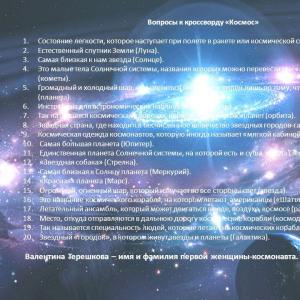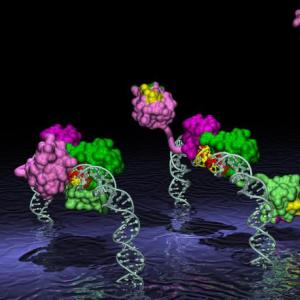The main problems in the Russian language exam. Problems for Unified State Exam texts
The topics of Unified State Examination essays in the Russian language are a rather abstract concept. We can rather talk about problems. Each text offered for analysis to a USE participant contains several problems. Usually there are at least three, but there are texts in which up to ten problems can be identified.
The most subjective moment. In fact, the problem may be present in the text, but not contained in the materials for the experts checking the students' work. Most experts in such situations take into account the formulation of the problem.
The difficulty is different: sometimes a student formulates a problem in an ugly way from the point of view of the Russian language, while thinking in the right direction. The result is correct, but difficult to understand content. The expert does not always grasp the connection between the text of the work and the materials according to which he must check. As a result, a correct thought is scored zero.
How to avoid this? There is a list of topics (problems) for Unified State Examination essays in the Russian language, it will be given below. This list contains brief but precise formulations that will definitely be understandable to an expert. Many of them are taken from previous years' exam revision materials or from official trial options exams. The problems may vary slightly depending on the source text, but in general the list is exhaustive.
The problem can be formulated in the form of a question or in the genitive case.
There is no difference in terms of assessing essays by experts. But using the first method (questioning) leads to writing a better essay. It makes it possible not to get confused and not to go off topic. Advice from site developers: formulate the problem in the form of a question. We will also formulate a list of topics (problems) in question form.
List of topics for essays on the Unified State Examination in the Russian language
The relationship between man and nature
How do human activities affect nature?
How should we treat nature?
Why is nature important to humans?
Should a person protect nature?
How does nature influence humans?
Why is consumerism towards nature bad?
Does man depend on nature?
Why do people often fail to see the beauty in nature?
How can nature inspire people?
How does the destructive power of nature manifest itself?
Why should you live in harmony with nature?
What is the beauty of nature?
Relationships between humans and animals
Why should a person care about animals?
Why do homeless animals evoke feelings of compassion?
How should people treat their pets?
Do all people love animals?
Why are people so often cruel to animals?
What makes a person kill animals?
Can an animal be useful to a person?
Is a person always more intelligent than an animal?
Family relationships, childhood
How does family influence the formation of a child’s personality?
Is there anything stronger than a mother's love?
How do parents care about their children?
Why are parents strict with their children?
What influences the process of forming a child’s worldview?
Is maternal love always good?
How does upbringing affect a person’s future?
Should children leave their parents?
What kind of atmosphere should there be in the family?
Do family relationships influence a child's character?
Why should parents be honest with their children?
Why do conflicts between “fathers” and “children” happen?
What do childhood memories mean to a person?
Can childhood always be called the happiest time?
The beauty and richness of the Russian language
What does a person's native language mean?
Why do you need to protect the Russian language?
What does an irresponsible attitude towards one’s native language lead to?
Why do young people neglect the rules of the Russian language?
What is the richness of the Russian language?
School, teachers, books
Why is it important for a person to get a good education?
How does the school participate in shaping a child’s personality?
Why are school lessons important?
Why should you remember your teachers?
Can every teacher be called good?
What should a real teacher be like?
Why should a person strive for knowledge?
What's wrong with not wanting to learn?
What consequences does the work of an incompetent teacher have?
How do books influence a person's worldview?
What place should reading occupy in a person’s life?
Inner world, moral qualities of a person
What can a person's appearance say?
Is a person beautiful on the outside always beautiful on the inside?
In what situations does a person’s character emerge?
Which internal qualities can a person be considered correct?
What is a truly rich inner world like?
Why do people commit immoral acts?
Can anything justify betrayal?
Why do people take the path of spiritual degradation?
How does cowardice manifest itself?
What kind of person can be called callous, heartless?
What does human cruelty lead to?
Why do intrapersonal conflicts occur?
Can moral person change your principles?
Friendship
Can true friendship ever end?
Why do quarrels happen between friends?
Why does friendship not tolerate betrayal?
What kind of person can be called a true friend?
Can friends be rivals?
Love
What is true love?
How should you treat the person you love?
Is love always happy?
What can a person do in the name of love?
Why is unrequited love dangerous?
Is it possible to forgive everything to a loved one?
Social problems
How should we treat the poor?
Why should you help the homeless?
Can you always trust the authorities?
How does the problem of veneration manifest itself?
Why can the rich control the destinies of the poor?
Why is crime rampant?
Is there any way to justify theft?
What can make a person a drunkard?
Are the poor always to blame for their financial situation?
Upbringing
What kind of person can be called well-mannered?
Will a well-mannered person be rude or rude?
Why should a person be responsive?
Who gives a person education?
Why is it important to respect others?
Should a person be polite?
Art in human life
Is it always talented person do they notice?
What does art give to a person?
How does music affect a person?
Is it possible to express through art what cannot be expressed in words?
What did music mean to people? wartime?
Do brilliant people always live happily?
Why do people love art?
How does art help people?
Wartime
Why was heroism common in wartime?
What are people who love their Motherland ready for?
What kind of person can be called a patriot?
How does false patriotism manifest itself?
Does it make sense to treat the enemy humanely?
Why is war a grief for every family?
Why should we remember war heroes?
How does humanity preserve the memory of the Great Patriotic War?
The list of problems can be expanded. New problems will be added to the general list, stay tuned.
We can talk endlessly about the problems that can be raised in the texts of the Russian language exam. No, the Unified State Exam is not that difficult. It’s just that everything about writing is always quite abstract and contradictory. And problems sometimes open up boundaries for imagination. It is human nature to perceive material due to his education, in accordance with the level of intelligence and upbringing. Therefore, where one sees nothing, another may find a problem.
Experts checking the Russian language exam have materials based on which scores are assigned. The criteria regarding literacy are transparent: the rules are the rules, there are no controversial issues here. Things are worse with the list of problems: the inspectors are provided with approximate range of problems. It usually presents formulations of the main problems. Usually there are 3-4 of them. But experience shows that in most texts there are much more problems.
Confusion ensues. “What should I do if my problem is not on the list?” - this is the question that worries almost half of the graduates who have just passed the exam. And there is reason to worry, because everything that will happen next depends on subjective opinion expert. Whether the reviewer will see the problem you highlighted in the source text or not - that is the question. It is possible, but not to “get” into the list of main problems. Therefore, it is better to rely on generally accepted formulations from the list of problems Unified State Exam essays.
Types of problems in writing the Unified State Exam format

You can find it in the corresponding section of the site. The purpose of this page is to help you remember common wordings. To make it easier to work with problems, you need to break them down into blocks. It will be great if you take the names of the blocks from this site and enter the problems from the list into each one yourself.
Philosophical problems
They address issues of the development of nature, society and man. Often we are talking about the meaning of life, the interaction of man and culture, the historical path of society. This group of problems seems difficult to many due to the fact that discussing the above issues requires preparation and a certain type of thinking.
Social problems
Associated with the functioning of society. Often these are topical issues that are still relevant today: respect for human rights, social progress, strengthening the role of science in society. It is easy to write about the problems of this group, because each of us interacts with the social sphere of society.
Political problems
Concerning power within the state, political parties. May be related to issues of war and peace, the choice of the path of reform or revolution. They change under the influence of time, adapting to the demands of society: for example, today the problems of terrorism and nationalism are actively discussed.
Moral issues
They are a product of the development of the spiritual sphere of society. Moral issues are associated with the assessment of situations and actions from a moral point of view (good and evil). The true beauty of a person is discussed, there is talk about the true moral qualities of a person. This also includes problems related to generational conflict.
Environmental issues
Texts dealing with these issues talk about the beauty and richness of nature. The relationship and interdependence of man and nature, the emergence of environmental crises, and the interaction of nature and human culture are discussed.
On the eve of the Unified State Examination in the Russian language, I would like to analyze several essays that received the maximum score - 24 primary scores. You will see that these essays are far from perfect, but due to their content they received the highest score.
1.

When I read this essay, I was surprised why it was awarded 24 points. It contains speech, grammatical and punctuation errors.
The verb “to sympathize” requires the addition “to whom/what” after itself.
“Listen and give advice” is a mistake in homogeneous members sentences, since these verbs require different cases after them (“listen to someone/what?” and “give advice to someone/what”).
“So” - in this context, is an introductory word and should be separated by a comma (slight punctuation error).
“About her position, herself” - the redundancy of pronouns gives rise to ambiguity.
“Sometimes” is an adverb of time and is not an introductory word, therefore, it is not isolated.
In addition, one can note a huge number of repetitions (speech error).
UPD: later, thanks to our user Lyubov Orlova, a spelling error was discovered: “using the example of a case.” Apparently the expert didn't think it was rude.
Nevertheless, this essay received maximum score. Perhaps due to the fatigue of the examiner, who did not notice the error (although essays worth 23-24 points are usually rechecked by several experts; perhaps I am still too picky). But we can take into account the fact that even the example from the dubious show “Let Them Talk” was awarded the highest rating.
2.

And here, too, minor errors are discovered.
You can’t “tell a story”: you can “tell a story” or “tell a story about someone/what.”
"They both": strictly speaking, the pronoun "they" should refer to the subject of the "sentence", not to "the hero and his mother".
The verb “experiences” without the addition “what/about whom/about what/because of what” passes into the category of colloquial vocabulary. In written speech, the verb needs an addition.
“Because of the husband’s ban” is not a clarifying construction, therefore it should not be isolated (a minor punctuation error).
“Birthday” - the name of the holiday is written with a small letter: “birthday” (slight spelling error).
In this essay, you can pay attention to the admissibility of reference to original text without quoting (using sentence numbers).
3.


This essay is distinguished by its richness of language and particularly successful composition (which includes the epigraph). The only significant drawback is the absence of the title of the work and the author in the second argument. But since the second argument can formally be taken even from the “Let Them Talk” program, this oversight did not prevent the author from receiving the highest score.
4.


What are the problems?
1.Moral problems
2.Social problems
3.Philosophical problems
4.Aesthetic problems
5.Political problems
6.Environmental problems
How to determine the main problem of the text?
1. See if there are any questions in the text you read.
2. Think about what problems the text contains.
3. Select the main one.
4. And if there are no interrogative sentences in the text, then you need to put questions to some sentences that contain main idea.
5. The answer to the question determines the problem of the text.
Formulation of specific text problems
1. The problem of the role of books in human life
2. The problem of the role of books in the formation of personality
3. The problem of the role of reading in human life
4. The problem of speech culture in human life
5. The problem of the relationship between human speech and his intellectual development
6. The problem of the development of the Russian language
7. The problem of preserving the Russian language
8. The problem of education today
9. The problem of mercy and compassion in our lives
10. The problem of preserving the soul
11. The problem of callousness and hard-heartedness
12. The problem of the role of love in human life
13. The problem of the role of friendship in our lives
14. The problem of the role of honor in human life
15. The problem of the role of conscience in human life
16. The problem of the role of patriotism in human life
17. The problem of loneliness in human life
18. Problem moral choice person
19. The problem of intergenerational relationships
20. The problem of relationships between family members
21. Problem moral significance memories in people's lives
22. The problem of human indifference
23. The problem of choosing the right life goal
24. The problem of the role of the Internet in human life
25. The problem of the role of generosity in our lives
26. The problem of the meaning of human life
27. The problem of attitude towards elderly parents.
28. The problem of the role of external and inner beauty in our lives
29. The problem of preserving monuments
30. The problem of the role of childhood memories in the lives of adults
31. Problems of adolescence
32. The problem of the role of parental influence on the formation of a child’s personality.
33. The problem of the role of nature in people's lives
34. The problem of historical memory
35. The problem of the role of money in people's lives
36. The problem of interethnic conflicts.
37. The problem of the role of art in human life.
38. The problem of the role of music in human life
39. Problems of attitude towards war
40. The problem of attitude towards animals
41. The role of the problem of selflessness and nobility of man
42. The problem of the role of talent and genius in human life
43. The problem of the role of freedom in human life
44. The problem of the importance of work in human life
45. Role problem popular culture in people's lives
46. The problem of moral lessons of war
47. The problem of indifferent and cruel attitude towards nature
48. The problem of human self-realization in life
49. The problem of tolerance and its role in relations between people
50. The problem of social inequality







